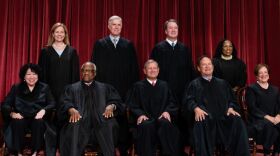-
The justices agreed to decide in its February argument session whether 19 states that oppose the Title 42 policy should be allowed to intervene in defense of the restrictions in the lower courts.
-
In the court Wednesday, lawyers for the state of Texas and for non-Native adoptive parents told the justices that ICWA violates the Constitution by discriminating based on race
-
The justices are re-examining decades of precedent allowing affirmative action policies. This time, however, there is every likelihood that the court will overrule some or all of those precedents.
-
Justice Amy Coney Barrett, who is assigned to the Seventh Circuit Court of Appeals, was the one who received the emergency application brought by a Wisconsin taxpayers group.
-
The action dashes hopes of American Samoans who were seeking birthright citizenship and leaves intact a decision that breathed new life into distinctions between U.S. states and territories.
-
At issue in Tuesday's case was Alabama's congressional redistricting plan, adopted by the Republican state legislature after the 2020 Census.
-
The case focuses on whether the Supreme Court should overrule Grutter v. Bollinger and hold that institutions of higher education cannot use race as a factor in admissions.
-
Four artists based in Vermont talk about their initial reactions to the Supreme Court's recent ruling on a case that rolled back reproductive rights and legal abortion in the United States. They also responded with creating music, dance, jewelry and visual art.
-
Congressman Peter Welch says the U.S. Supreme Court is "working on behalf of an extreme right-wing agenda" following several recent decisions.
-
On Thursday, the Supreme Court handed down a decision on West Virginia vs. EPA that majorly restricts the agency's power to regulate emissions from power plants. But what does that mean for Vermont?
�������� is independent, community-supported media, serving Vermont with trusted, relevant and essential information. We share stories that bring people together, from every corner of our region. New to ��������? Start here.
© 2025 �������� | 365 Troy Ave. Colchester, VT 05446
Public Files:
· · · ·
· · · ·
· · · ·
· ·
For assistance accessing our public files, please contact [email protected] or call 802-655-9451.
© 2025 �������� | 365 Troy Ave. Colchester, VT 05446
Public Files:
· · · ·
· · · ·
· · · ·
· ·
For assistance accessing our public files, please contact [email protected] or call 802-655-9451.
Play Live Radio
Next Up:
0:00
0:00
Available On Air Stations










